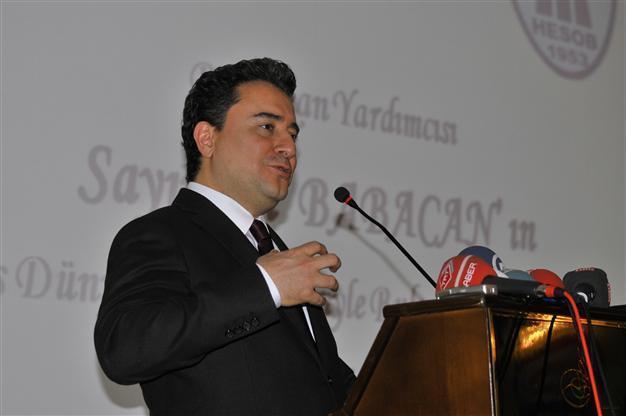Foreigners fail to get Turkey, says Turkish Deputy PM Babacan
SYDNEY

Deputy PM Ali Babacan urged the developed countries to lessen the increasing dependence on monetary policies to maintain stability. AA Photo
Foreigners have a difficult time understanding what is going on in Turkey amid recent political events, Deputy Prime Minister Ali Babacan has said, while noting that the country is continuing to attract investments.“We’re trying to explain to [foreigners] the developments in both the economic and political arenas,” Babacan said at a G-20 finance meeting in Australia, alluding to the December graft probe.
“Of course, when viewed from afar, it might not be easy to understand what’s going on. Political developments in Turkey are especially particular to us – they’re not developments that are typically seen in other countries,” he said.
“The perception of those who are looking from afar or who only follow Turkey via the international media is quite negative,” he said.
Despite the difficulties, Babacan said many investors were continuing to conduct long-term investments in the country.
Babacan also said developed nations among the G-20 need to put their fiscal house in order and lessen the need for central banks to support their economies with monetary policy.
Babacan urged the developed countries to abate their stimulus programs and to adopt better spending management to avoid market volatility and lessen the increasing dependence on monetary policies to maintain stability.
He also said developed economies needed to remember that “we are all in the same boat” and that the key to restore global financial stability was to act together, Sydney Morning Herald reported.
Turkey’s Central Bank had stunned investors by hiking rates by some 500 basis points at an emergency meeting on Jan. 28, initially sending the Turkish Lira sharply higher from record lows and helping short-circuit a vicious cycle of selling in emerging markets.
The Central Bank told economists this week it expects average funding costs to hover at around 10 percent for the foreseeable future, signaling it has no plans to hike interest rates further in the short term.
The rout in the Turkish market was aggravated when risks to political stability, which rose in the wake of a graft probe that sparked a political crisis in the country bracing for local elections, were added to worries sparked by U.S. Federal Reserve’s decision to cut its stimulus program.
However, the market turmoil sparked by the Federal Reserve’s steps toward removing the U.S. economy from life support affected almost all emerging economies and is expected to be a top agenda item when finance chiefs from the world’s biggest economies meet in Sydney this weekend. The G-20 finance ministers and central bankers meeting is a precursor to the main G-20 summit that will be held in the Australian city of Brisbane in November. The meeting’s host, Australian Treasurer Joe Hockey, said the Federal Reserve’s decision to begin scaling back its stimulus will be a key part of discussions, along with reinvigorating global growth.
In December, the U.S. central bank said it would start reducing its monthly Treasury and mortgage bond purchases, intended to keep interest rates low and support economic recovery in the aftermath of the global recession. Investors responded by pulling out of emerging markets and funneling their money to the U.S. in hopes of higher returns, which contributed to sharp falls in stock markets and the currencies of some developing countries.
The G-20, which represents around 85 percent of the global economy, is made up of both wealthy nations and emerging economies from the United States to Saudi Arabia and China.
















